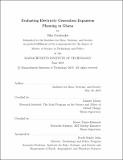Evaluating electricity generation expansion planning in Ghana
Author(s)
Gadzanku, Sika.
Download1117774571-MIT.pdf (8.564Mb)
Other Contributors
Massachusetts Institute of Technology. Institute for Data, Systems, and Society.
Technology and Policy Program.
Advisor
Jennifer Morris and Karen Tapia-Ahumada.
Terms of use
Metadata
Show full item recordAbstract
Ghana, a West African nation of 28 million people, provides an interesting case study on the interaction between power supply and politics in emerging economies. From 2012-2016, due to security of supply issues around hydro and fuel supplies, Ghana experienced the worst power crisis in its history with regular rolling blackouts. Rural and low-income urban areas and businesses were especially affected, and public discontent was palpable. The government's response was a reactive approach to generation expansion planning, focused on increasing supply. Power generation was opened up to the private sector and emergency power plants were procured. 93 percent of capacity installed during this post-crisis period was thermal generation, which increased dependence on natural gas and crude oil. Overall, this power crisis highlighted the cost of overlooking reliability and an undiversified generation mix. I adapted a modeling framework to study Ghana's power generation system and I use a bottom-up capacity expansion and economic dispatch model to explore generation expansion pathways in the country under different settings, with the goal of providing insights into Ghana's capacity expansion decisions and identifying strategies that can help ensure better reliability and resiliency. Secondly, I use qualitative methods to evaluate Ghana's electricity infrastructure project financing framework to discuss how project financing shapes technology choices. I then explore potential policy and legal instruments that could support more robust systems planning in Ghana's electricity generation sector. Results reveal that a future power crisis is very likely given the high sensitivity of system reliability and resilience to natural gas and crude oil supply, global energy prices and transmission constraints. Strategies that could help avoid a future crisis include diversifying the generation mix, adding flexible generation (such as pumped hydro) to the mix, increasing transmission, and increasing the stability of fuel supply. This requires a holistic and coordinated approach to electricity planning between financial, technical, technological and political actors in the power generation sector.
Description
This electronic version was submitted by the student author. The certified thesis is available in the Institute Archives and Special Collections. Thesis: S.M. in Technology and Policy, Massachusetts Institute of Technology, School of Engineering, Institute for Data, Systems, and Society, 2019 Cataloged from student-submitted PDF version of thesis. Includes bibliographical references (pages 157-166).
Date issued
2019Department
Massachusetts Institute of Technology. Institute for Data, Systems, and Society; Massachusetts Institute of Technology. Engineering Systems Division; Technology and Policy ProgramPublisher
Massachusetts Institute of Technology
Keywords
Institute for Data, Systems, and Society., Technology and Policy Program.